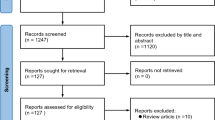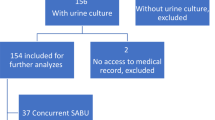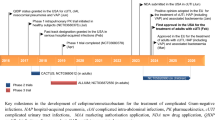Abstract
Extended-spectrum β-lactamase-producing Enterobacteriales (ESBL-PE) are often associated with inappropriate empirical therapy (IAT). The aim of this study was to investigate whether IAT of acute pyelonephritis (APN) caused by ESBL-PE is related to adverse outcomes. A retrospective cohort study was performed at a tertiary-care hospital from 2014 through 2016. Patients who had APN caused by ESBL-PE and were definitely treated with appropriate antibiotics for at least 7 days were enrolled. IAT was defined as when inappropriate empirical antibiotics were given 48 h or longer after initial diagnosis of APN. Primary endpoint was treatment failure defined as clinical and/or microbiologic failure. Secondary endpoints were length of hospital stay and recurrence of APN. Propensity score matching was used to adjust heterogeneity of each group. Among 175 eligible cases, 59 patients received IAT and 116 patients received appropriate empirical antimicrobial therapy (AT). Treatment failure was observed in five (8.4%) patients and nine (7.8%) patients in each group, respectively. After matching, the treatment failure rate was similar between both groups (adjusted odd ratio [aOR] 1.05; 95% confidence index [CI] 0.26–4.15). The length of hospital stay (median 11 days in the IAT group versus 11 days in the AT group; P = 0.717) and absence of recurrence within 2 months (90.3% in IAT and 86.7% in AT; P = 0.642) were also similar. IAT did not adversely affect the clinical outcome. In this regard, clinicians should be more cautious about indiscriminate prescription of broad-spectrum antibiotics such as carbapenem empirically for treatment of APN possibly caused by ESBL-PE.


Similar content being viewed by others
References
Pitout JD, Laupland KB (2008) Extended-spectrum beta-lactamase-producing Enterobacteriaceae: an emerging public-health concern. Lancet Infect Dis 8(3):159–166
Kang CI, Song JH, Chung DR, Peck KR, Ko KS, Yeom JS, Ki HK, Son JS, Lee SS, Kim YS, Jung SI, Kim SW, Chang HH, Ryu SY, Kwon KT, Lee H, Moon C, Shin SY, Korean Network for Study of Infectious D (2010) Risk factors and treatment outcomes of community-onset bacteraemia caused by extended-spectrum beta-lactamase-producing Escherichia coli. Int J Antimicrob Agents 36(3):284–287
MacVane SH, Tuttle LO, Nicolau DP (2014) Impact of extended-spectrum beta-lactamase-producing organisms on clinical and economic outcomes in patients with urinary tract infection. J Hosp Med 9(4):232–238
Lee CH, Chu FY, Hsieh CC, Hong MY, Chi CH, Ko WC, Lee CC (2017) A simple scoring algorithm predicting extended-spectrum beta-lactamase producers in adults with community-onset monomicrobial Enterobacteriaceae bacteremia: matters of frequent emergency department users. Medicine (Baltimore) 96(16):e6648
Rhodes A, Evans LE, Alhazzani W, Levy MM, Antonelli M, Ferrer R, Kumar A, Sevransky JE, Sprung CL, Nunnally ME, Rochwerg B, Rubenfeld GD, Angus DC, Annane D, Beale RJ, Bellinghan GJ, Bernard GR, Chiche JD, Coopersmith C, De Backer DP, French CJ, Fujishima S, Gerlach H, Hidalgo JL, Hollenberg SM, Jones AE, Karnad DR, Kleinpell RM, Koh Y, Lisboa TC, Machado FR, Marini JJ, Marshall JC, Mazuski JE, McIntyre LA, McLean AS, Mehta S, Moreno RP, Myburgh J, Navalesi P, Nishida O, Osborn TM, Perner A, Plunkett CM, Ranieri M, Schorr CA, Seckel MA, Seymour CW, Shieh L, Shukri KA, Simpson SQ, Singer M, Thompson BT, Townsend SR, Van der Poll T, Vincent JL, Wiersinga WJ, Zimmerman JL, Dellinger RP (2017) Surviving sepsis campaign: international guidelines for management of sepsis and septic shock: 2016. Crit Care Med 45(3):486–552
Kang CI, Kim SH, Kim DM, Park WB, Lee KD, Kim HB, Oh MD, Kim EC, Choe KW (2004) Risk factors for and clinical outcomes of bloodstream infections caused by extended-spectrum beta-lactamase-producing Klebsiella pneumoniae. Infect Control Hosp Epidemiol 25(10):860–867
Tumbarello M, Sanguinetti M, Montuori E, Trecarichi EM, Posteraro B, Fiori B, Citton R, D'Inzeo T, Fadda G, Cauda R, Spanu T (2007) Predictors of mortality in patients with bloodstream infections caused by extended-spectrum-beta-lactamase-producing Enterobacteriaceae: importance of inadequate initial antimicrobial treatment. Antimicrob Agents Chemother 51(6):1987–1994
Tumbarello M, Sali M, Trecarichi EM, Leone F, Rossi M, Fiori B, De Pascale G, D'Inzeo T, Sanguinetti M, Fadda G, Cauda R, Spanu T (2008) Bloodstream infections caused by extended-spectrum-beta-lactamase- producing Escherichia coli: risk factors for inadequate initial antimicrobial therapy. Antimicrob Agents Chemother 52(9):3244–3252
De Rosa FG, Pagani N, Fossati L, Raviolo S, Cometto C, Cavallerio P, Parlato C, Guglielmi E, Serra R, Di Perri G (2011) The effect of inappropriate therapy on bacteremia by ESBL-producing bacteria. Infection 39(6):555–561
Kang CI, Sung YK, Lee KH, Lee KT, Lee JK (2013) Clinical impact of inappropriate initial antimicrobial therapy on outcome in bacteremic biliary tract infections. Scand J Infect Dis 45(3):227–234
Frakking FN, Rottier WC, Dorigo-Zetsma JW, van Hattem JM, van Hees BC, Kluytmans JA, Lutgens SP, Prins JM, Thijsen SF, Verbon A, Vlaminckx BJ, Cohen Stuart JW, Leverstein-van Hall MA, Bonten MJ (2013) Appropriateness of empirical treatment and outcome in bacteremia caused by extended-spectrum-beta-lactamase-producing bacteria. Antimicrob Agents Chemother 57(7):3092–3099
Joo EJ, Park DA, Lee NR, Moon SY, Choi JK, Ko JH, Peck KR (2017) Impact of appropriateness of empiric therapy on outcomes in community-onset bacteremia by extended-spectrum-beta-lactamase producing Escherichia coli and Klebisella pneumoniae definitively treated with carbapenems. Eur J Clin Microbiol Infect Dis 36(11):2093–2100
Madhi F, Jung C, Timsit S, Levy C, Biscardi S, Lorrot M, Grimprel E, Hees L, Craiu I, Galerne A, Dubos F, Cixous E, Hentgen V, Bechet S, Urinary-tract Infection Due to Extended-Spectrum Beta-Lactamase-Producing Enterobacteriaceae in Children G, Bonacorsi S, Cohen R (2018) Febrile urinary-tract infection due to extended-spectrum beta-lactamase-producing Enterobacteriaceae in children: a French prospective multicenter study. PLoS One 13(1):e0190910
Kim B, Kim J, Seo MR, Wie SH, Cho YK, Lim SK, Lee JS, Kwon KT, Lee H, Cheong HJ, Park DW, Ryu SY, Chung MH, Ki M, Pai H (2013) Clinical characteristics of community-acquired acute pyelonephritis caused by ESBL-producing pathogens in South Korea. Infection 41(3):603–612
Kim SA, Altshuler J, Paris D, Fedorenko M (2018) Cefepime versus carbapenems for the treatment of urinary tract infections caused by extended-spectrum beta-lactamase-producing enterobacteriaceae. Int J Antimicrob Agents 51(1):155–158
Kim S-H, Huh K, Cho SY, Kang C-I, Chung DR, Peck KR (2018) Factors associated with the recurrence of acute pyelonephritis caused by extended-Spectrum β-lactamase-producing Escherichia coli: the importance of infectious disease consultation. Diagn Microbiol Infect Dis
Fairley KF, Carson NE, Gutch RC, Leighton P, Grounds AD, Laird EC, McCallum PH, Sleeman RL, O’Keefe CM (1971) Site of infection in acute urinary-tract infection in general practice. Lancet 2(7725):615–618
Cardoso T, Almeida M, Friedman ND, Aragao I, Costa-Pereira A, Sarmento AE, Azevedo L (2014) Classification of healthcare-associated infection: a systematic review 10 years after the first proposal. BMC Med 12:40
Charlson ME, Pompei P, Ales KL, MacKenzie CR (1987) A new method of classifying prognostic comorbidity in longitudinal studies: development and validation. J Chronic Dis 40(5):373–383
U.S. Department of Health and Human Services Common Terminology Criteria for Adverse Events (CTCAE) Version 5.0. https://ctep.cancer.gov/protocoldevelopment/electronic_applications/docs/CTCAE_v5_Quick_Reference_8.5x11.pdf. Accessed 1 Nov 2018
Malaisri C, Phuphuakrat A, Wibulpolprasert A, Santanirand P, Kiertiburanakul S (2017) A randomized controlled trial of sitafloxacin vs. ertapenem as a switch therapy after treatment for acute pyelonephritis caused by extended-spectrum beta-lactamase-producing Escherichia coli: a pilot study. J Infect Chemother 23(8):556–562
Chow S, Shao J, Wang H (2008) Sample size calculations in clinical research, 2nd edn, p 89
Schwaber MJ, Carmeli Y (2007) Mortality and delay in effective therapy associated with extended-spectrum beta-lactamase production in Enterobacteriaceae bacteraemia: a systematic review and meta-analysis. J Antimicrob Chemother 60(5):913–920
Goodman KE, Lessler J, Cosgrove SE, Harris AD, Lautenbach E, Han JH, Milstone AM, Massey CJ, Tamma PD, Antibacterial Resistance Leadership G (2016) A clinical decision tree to predict whether a bacteremic patient is infected with an extended-spectrum beta-lactamase-producing organism. Clin Infect Dis 63(7):896–903
Lee CC, Chang CM, Hong MY, Hsu HC, Ko WC (2013) Different impact of the appropriateness of empirical antibiotics for bacteremia among younger adults and the elderly in the ED. Am J Emerg Med 31(2):282–290
Jeon JH, Kim K, Han WD, Song SH, Park KU, Rhee JE, Song KH, Park WB, Kim ES, Park SW, Kim NJ, Oh MD, Kim HB (2012) Empirical use of ciprofloxacin for acute uncomplicated pyelonephritis caused by Escherichia coli in communities where the prevalence of fluoroquinolone resistance is high. Antimicrob Agents Chemother 56(6):3043–3046
Chang UI, Kim HW, Wie SH (2016) Use of cefuroxime for women with community-onset acute pyelonephritis caused by cefuroxime-susceptible or -resistant Escherichia coli. Korean J Intern Med 31(1):145–155
Greenhouse I, Babushkin F, Finn T, Shimoni Z, Aliman M, Ben-Ami R, Cohen R (2017) Long-term outcomes of inappropriate antibiotic therapy for upper urinary tract infections caused by extended-spectrum beta-lactamase-producing Enterobacteriaceae: a retrospective cohort study. Diagn Microbiol Infect Dis 89(3):222–229
Gupta K, Hooton TM, Naber KG, Wullt B, Colgan R, Miller LG, Moran GJ, Nicolle LE, Raz R, Schaeffer AJ, Soper DE, Infectious Diseases Society of A, European Society for M, Infectious D (2011) International clinical practice guidelines for the treatment of acute uncomplicated cystitis and pyelonephritis in women: a 2010 update by the Infectious Diseases Society of America and the European Society for Microbiology and Infectious Diseases. Clin Infect Dis 52(5):e103–e120
Paterson DL, Bonomo RA (2005) Extended-spectrum beta-lactamases: a clinical update. Clin Microbiol Rev 18(4):657–686
Author information
Authors and Affiliations
Corresponding author
Ethics declarations
Conflicts of interest
The authors declare that they have no conflict of interest.
Ethical statement
The study was approved by the local ethical research committee (IRB number: 2018–05-089).
Additional information
Publisher’s note
Springer Nature remains neutral with regard to jurisdictional claims in published maps and institutional affiliations.
Rights and permissions
About this article
Cite this article
Kim, SH., Oh, S., Huh, K. et al. Inappropriate empirical antibiotic therapy does not adversely affect the clinical outcomes of patients with acute pyelonephritis caused by extended-spectrum β-lactamase-producing Enterobacteriales. Eur J Clin Microbiol Infect Dis 38, 937–944 (2019). https://doi.org/10.1007/s10096-019-03528-9
Received:
Accepted:
Published:
Issue Date:
DOI: https://doi.org/10.1007/s10096-019-03528-9




